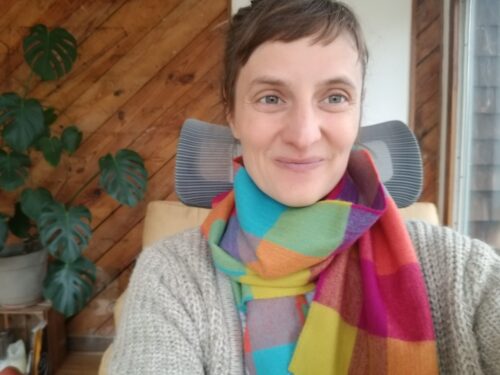
“In early 2006, I traveled to New Orleans to join disaster-relief work after Hurricane Katrina. When I arrived, I found an incredible community of social movement workers and community organizers who were weaving a web of purposeful and righteous action in the wake. I had the opportunity to learn from elders, many of whom had been organizing in New Orleans for decades if not generations, about what it means to build cross-identity movements that center those most impacted by the violence of oppression. Learning such a clear political analysis, grounded in history and place, brought my whole life experience to date into clear relief. It helped me make sense of my upbringing as a white person, a cis queer person, in an upper-middle class suburb of DC; and it helped me start to understand a role for myself as part of movement. Since coming back home to the DC Metro Area in 2008, I’ve carried the learnings and gratitude from that time into my racial justice work, my facilitation, my spiritual development, and in fact into every aspect of my life.”
Rebecca Mintz (she/her) is a facilitator of transformative dialogue and practice. She holds space for dialogue on the individual level through coaching, the interpersonal or group level through political education and conflict transformation work, and on the organizational level through full-scale collective change processes. On all three levels, she works from a core belief that we can change (and be changed) toward collective liberation when we turn toward the challenging conversations that are calling from our growing edges. Mintz creates spaces for people and teams to engage courageous conversations, so that the collective can build strong social movements as healthfully and effectively as possible.
As a member of organizational change facilitation teams, Mintz supports internal change leaders to pinpoint live questions that need to be explored. Often, these questions center around organizational strategy (what we are trying to do), structure (how we organize ourselves to do the work), and culture (how we “be” together as we work toward justice). Because these questions always intersect with dynamics of power and identity, Mintz works with internal change leaders to shape democratic processes, attending to and adjusting for power dynamics, so that people throughout the organizational ecosystem can contribute their key perspectives to the conversation toward change.
As a facilitator of conflict processes, Mintz uses a transformative justice approach that sees conflicts through a broader lens of social power and systems of oppression. With that starting view, she works with participants to determine a process for sharing feedback, boundaries, and requests; this process looks different in each case depending on the kinds and directions of harm, the power dynamics at play, and how those involved believe healing can happen. In conflict facilitation work, Mintz believes that healing dialogue requires vulnerability, which in turn requires investment, faith in the value of the relationship, healthy boundary-setting, and informed consent.
Finally, as a political educator and healing-centered coach, Mintz supports people to become both healthier in their own right AND more effective contributors to social change. As a coach, she draws on various bodies of practice such as meditation, the enneagram, and somatics in order to help clients notice, name, and release limiting beliefs and habits, replacing them instead with liberatory practices such as courage, abundance, and interdependence. As a white person, Mintz is particularly passionate about creating healing spaces for white folks to reshape from training in white supremacy culture into more liberatory ways of showing up for themselves and in the world.
Mintz is a mediocre but wildly enthusiastic singer, loves dogs and the woods and her constantly evolving spiritual practice, and lives in Takoma Park, Maryland.
